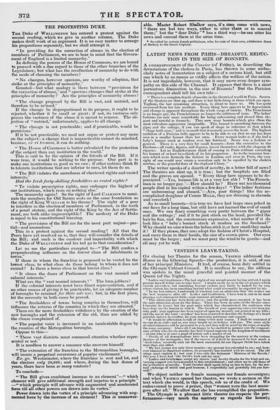• THE PROTESTING DUKE.
THE Duke of WELLINGTON has entered a protest against the second reading, which we give in another column. The Duke makes droll work of an argument. It is no easy matter to arrange his propositions separately, but we shall attempt it.
"In providing for the correction of abuses in the election of members of Parliament, we are to bear in mind that the Govern- ment of England is a limited monarchy." In defining the powers of the House of Commons, we are bound to proceed with a due regard to those of the other branches of the Legislature; but what has the recollection of monarchy to do with the mode of choosing the members?
" No changes, however specious, are worthy of adoption, that strike at the principles of monarchy." Granted—but what analogy is there between "provisions for the correction of abuses," and "specious changes that strike at the principles of monarchy ?" Are the principles of monarchy abuses ?
"The change proposed by the Bill is vast, and untried, and therefore to be refused."
If the change be disproportioned to its purpose, it ought to be rejected, whether it be small or great; if not, its vastness only proves the vastness of the abuse it is meant to remove. The ob- jection of " untried," unfortunately, applies to all change.
" The change is not practicable; and if practicable, would be pernicious." . If it be not practicable, we need not argue or protest any more on the subject : a change that is impracticable cannot do mischief, because, ex vi termini, it can do nothing.
" The House of Commons is better calculated for the protection of the subject than any institution in the world." This is said to be the opinion of the friends of the Bill. If it were true, it would be nothing to the purpose. Our part is to Make our institutions as good as we can ; if other nations think fit to tolerate institutions that arc inferior to ours, let them do so.
" The Bill violates the sacredness of chartered rights and vested interests."
Had thei Irish forty-shilling freeholders no vested rights?
' To violate prescriptive rights, may endanger the highest of our institutions, which rests on nothing else." The monarchy again! So the right of Lord CALEDON to nomi- nate the members for Old Sarum rests on the same foundation as the right of Kine. WILLIAM to his throne ! The right of a peer to interfere in the election of members of Parliament, in the teeth of a penal statute, and the right of the King by the Act of Settle- ment, are both alike imprescriptible! The modesty of the Duke is equal to his constitutional learning.
" The provisions of the Bill are for the most part unjust—par- tialand anomalous."
This in a protest against the second reading ! All that the Peers have yet resolved on is, that they will consider the details of the Bill; and such is the candour and impartiality with which the Duke of WELLINGTON and his tail go to that consideration!
Let us see the particulars excepted to—" The Bill confers a preponderating influence on the lowest class of inhabitants in towns."
If those in whom the franchise is proposed to be vested be the lowest class, to what class do those belong to whom it does not extend? Is there a lower class in that lowest class ?
. " It closes the doors of Parliament on the vast monied and colonial interests."
What are the " vast monied interests ?" The loan-jobbers?
if the colonial interests must have direct representation, and if no other means of giving it be practicable, let an adequate number of boroughs be retained for their sole use; but, in the first place, let the necessity in both cases be proved.
"The freeholders of towns being counties in themselves, will influence the returns of the counties in which they are situated."
There arc far more freeholders withdrawn by the creation of the new boroughs and the extension of the old, than are added by the clause complained of.
".The populai voice is increased in an incalculable degree by the creation of the Metropolitan boroughs. Oppose to this— • " These vast districts must command attention whether repre- sented or not."
It is needless to answer a reasoner who answers himself.
" The extension of the franchise to the Metropolitan boroughs, will insure a perpetual recurrence .of popular excitement." • Ex. gr. Westminster, where the franchise is scot and lot, and the electors only 20,000; and where, during the last dozen of years, there have been so many contests !
To conclude- ' The Bill gives exorbitant increase to an element"—" which element will give additional strength and impetus to a principle" —"Which principle will advance with augmented and accelerated force till all other powers are drawn into its vortex."
Power drawn into the vortex of a principle advancing with aug- mented force by the increase of an element! This is unanswer- able. Master Robert Shallow says, if a man come with news, " there are but two ways, either to utter thrift or to conceal them;" but the "dear Duke"* 41 has a third way—he can utter his news and conceal them at the same time.
• So called by certain female politicians, who, for ends of their own, administer doses of flattery to the Great Captain.






















 Previous page
Previous page